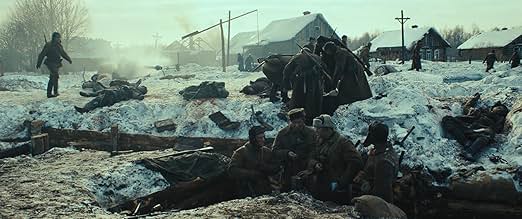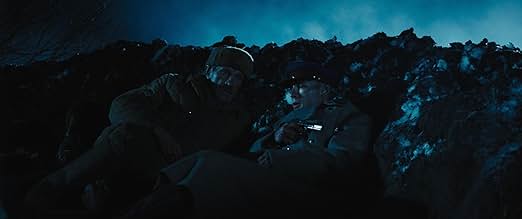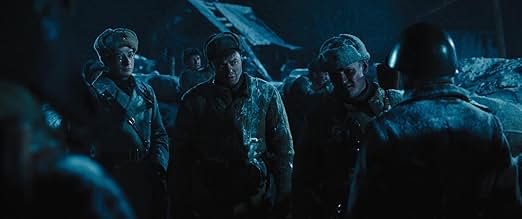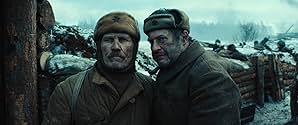PUNTUACIÓN EN IMDb
6,1/10
1,4 mil
TU PUNTUACIÓN
Entre el invierno de 1942 y 1943, en la ciudad de Rzhev, sucedieron una serie de batallas no tan conocidas en la historia mundial, pero que fueron terriblemente sangrientas. Esas batallas re... Leer todoEntre el invierno de 1942 y 1943, en la ciudad de Rzhev, sucedieron una serie de batallas no tan conocidas en la historia mundial, pero que fueron terriblemente sangrientas. Esas batallas recibieron el nombre de: Picadora de carne Rzhev.Entre el invierno de 1942 y 1943, en la ciudad de Rzhev, sucedieron una serie de batallas no tan conocidas en la historia mundial, pero que fueron terriblemente sangrientas. Esas batallas recibieron el nombre de: Picadora de carne Rzhev.
- Dirección
- Guión
- Reparto principal
- Premios
- 1 nominación en total
Daniil Voropaev
- Sgt. Lavrov
- (as Danila Voropaev)
Reseñas destacadas
The opening battle scene was good but suffered from war movie clichés, like having a guy drag another to safety only to find half his body missing. They also have those stock characters, the scavenger, the harsh Commissar, and the heroic, square jawed commander. But as the movie progresses, the actors settle into their roles. The commander is especially likable.
The movie is well structured. After the opening battle there is a tense pause before the German counter-attack. This gives the actors time to show us the state or the Red Army in 1942. We see the tension between the regular army and the Commissars. All war movies glam up battle scenes but it was less than a typical American production.
The behavior of the Commissars is portrayed negatively but we hear enough to understand why they identify so strongly with the state. This does not justify them but it lets you see them as humans who took a wrong turn. The Commissars have logical, if flawed, reasons for their decisions as their heavy handedness creates hostility. After a tense argument, a Commissar refuses to send help to a unit that just took a position, blurting out, 'whatever we send them will be a total loss'. He assumes the officer is being emotional but he is not allowing the army to prove what they could do given resources at critical times. I thought this interplay was well done but you have to look for it, this good writing.
They used the church imagery effectively. You see it wherever they went. You see them standing next to a wall decorated with icons and in a basement. Religious themes can feel forced but here it felt natural. Even the Commissars, famous for their atheism, chose to ignore its presence rather than fight it. You could see this going through their minds with one uncomfortable glance. The Church belonged there the Germans did not. When a German emerged from an Orthodox church at night with a flame thrower, it was chilling. It was as if they were assaulting the essence of the town.
The Germans were a better foil here than in American movies. In U. S. movies they are portrayed as evil but incompetent. This detracts from their seriousness. Here they are deadly and their presence is like a dark cloud.
Except for a few common war movie tropes, this was a very good movie.
The movie is well structured. After the opening battle there is a tense pause before the German counter-attack. This gives the actors time to show us the state or the Red Army in 1942. We see the tension between the regular army and the Commissars. All war movies glam up battle scenes but it was less than a typical American production.
The behavior of the Commissars is portrayed negatively but we hear enough to understand why they identify so strongly with the state. This does not justify them but it lets you see them as humans who took a wrong turn. The Commissars have logical, if flawed, reasons for their decisions as their heavy handedness creates hostility. After a tense argument, a Commissar refuses to send help to a unit that just took a position, blurting out, 'whatever we send them will be a total loss'. He assumes the officer is being emotional but he is not allowing the army to prove what they could do given resources at critical times. I thought this interplay was well done but you have to look for it, this good writing.
They used the church imagery effectively. You see it wherever they went. You see them standing next to a wall decorated with icons and in a basement. Religious themes can feel forced but here it felt natural. Even the Commissars, famous for their atheism, chose to ignore its presence rather than fight it. You could see this going through their minds with one uncomfortable glance. The Church belonged there the Germans did not. When a German emerged from an Orthodox church at night with a flame thrower, it was chilling. It was as if they were assaulting the essence of the town.
The Germans were a better foil here than in American movies. In U. S. movies they are portrayed as evil but incompetent. This detracts from their seriousness. Here they are deadly and their presence is like a dark cloud.
Except for a few common war movie tropes, this was a very good movie.
At last a real good Russian war movie, about the Great Patriotic War, a subject rarely close to real, actual events. There are batches of garbage propaganda stuff, where the Germans are always shown as idiots - idiots who provoked more than 25 millions deaths among the Russian population.....Here, the focus is on the Political Commisars, the Politrouks, who killed anyone who hesitated to fight. This point of view was rarely spoken in Russian movies. In this film, the enemy is maybe more them than the Germans. Political commissars and their bloodthirsty decisions, who ordered the deaths of thousands of soldiers only to take a simple hill. For Staline and his gang, the human life of their own fellows was nothing. They were more than Germans; one Nazi for one hundred Russians. An unbalanced fight. I have always found weird and not logical that people defending their life, freedom and homeland - the Russians - needed Political commissars to prevent them to desert.....The Nazis did not in Russia; maybe for obvious reasosn though. Where a deserter would have been, among the "Untermenschen", slavic "under men'; they were safer in the middle of their own "kameraden'...So, to summarize, I highly recommend this feature.
Don't look at the ratings and comments here. It's a nice experience, the movie captured me the whole time. You won't regret watching it.
No pun intended, really not meant to offend anyone either. You are literally thrown into the second world war though. There is no romantic sentiment or anything close to that in here. Yes the Russians are being shown as heroes and as strong as you can imagine. That being said, try not to compare that situation with what is going on right now in Ukraine.
I may be a bit too nice describing the current situation. But that is not about that, it is about the horror of war. And what it sometimes takes to win - even if it may not always feel that way. And that even the smallest victories can have a big impact. If you are what they call a history buff, you will know what I mean - or after you watch the movie it will become apparent too. A lot of violence obviously, but that is what happens during war - this does not hold back on anything.
I may be a bit too nice describing the current situation. But that is not about that, it is about the horror of war. And what it sometimes takes to win - even if it may not always feel that way. And that even the smallest victories can have a big impact. If you are what they call a history buff, you will know what I mean - or after you watch the movie it will become apparent too. A lot of violence obviously, but that is what happens during war - this does not hold back on anything.
The rating on this one is baffling as it is clearly undeserved. This movie captures the Eastern Front very well, more so than many other Russian movies I have so far seen. If you liked 1993's Stalingrad, you will like this one.
¿Sabías que...?
- CuriosidadesDuring the last battle a jet trail can be seen in the sky
Selecciones populares
Inicia sesión para calificar y añadir a tu lista para recibir recomendaciones personalizadas
- How long is Rzhev?Con tecnología de Alexa
Detalles
Taquilla
- Recaudación en todo el mundo
- 1.401.156 US$
- Duración1 hora 53 minutos
- Color
Contribuir a esta página
Sugerir un cambio o añadir el contenido que falta

Principal laguna de datos
What is the Italian language plot outline for 1942: La gran ofensiva (2019)?
Responde























